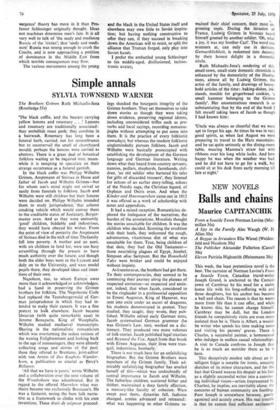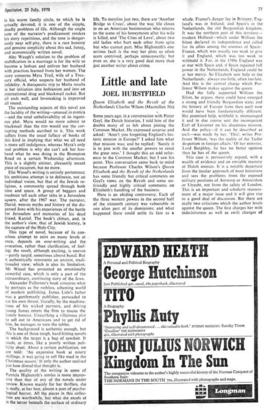NEW NOVELS
Balls and chains
Maurice CAPITANCHIli
From a Seaside Town Norman Levine (Mac- millan 36s) A Spy in the Family Alec Waugh (W. H. Allen 30s) A Beggar in Jerusalem Elie Wiesel (Weiden- feld and Nicolson 30s) The Publisher Alexander Fullerton (Cassell 30s) Eleven Patricia Highsmith (Heinemann 30s) This week, the least pretentious novel is the best. The narrator of Norman Levine's From a Seaside Town, Canadian travel-writer Joseph Grand, is anchored to the Cornish town of Carnbray by his need for a stable home life with his long-suffering wife and three daughters, but his anchor has become a ball and chain. The reason is that he wants more from life than it can offer, and while he knows this, he cannot change himself. Carnbray may be dull, but the London friends he compulsively visits are even more isolated than he is. There is Albert, a would- be writer who spends his time making notes and visiting his parents' graves. There is Charles, a successful painter, a homosexual who indulges in endless casual relationships. A visit to Canada confirms to Joseph that he is as much an outsider there as he is here.
This deceptively modest tale about an in- telligent fidget is notable for ironic, amusing sketches of its minor characters, and for the fact that Grand weaves his despair at his fate as a slightly successful writer into a convinc- ing individual vision—artists (represented by Charles), he implies, are inevitably alone; the concerns of human community are footling. Poor Joseph is somewhere between, gently agonised and acutely aware. His real trouble is that he cannot find sufficient excitement
in his warm family circle, to which he is actually devoted; it is one of the simple, deadly problems of life. Although the single note of the narrator's predicament renders his story repetitious, and the tone is danger- ously near self-pity, there is a rare honesty and genuine simplicity about this sad, funny, and economically written novel.
Alec Waugh's solution to the problem of stultification in a marriage is for the wife to become a lesbian and enliven her husband with practices learned from her women. The story concerns Myra Trail, wife of a Trea- sury official, who suspects her husband of infidelity. A therapeutic trip to Malta results in her initiation into lesbianism and into an international drug and blackmail racket. But all ends well, and lovemaking is improved all round.
The outstanding aspects of this novel are the lucidity of the writing—unusual in erotica —and the total unbelievability of its ingeni-
ous plot. Myra would no more submit to blackmail than the CID would use the cor-
rupting methods ascribed to it. This work suffers from the usual fallacy of books of this kind in implying that what we all need is more self-indulgence, whereas Myra's only real problem is why she can't ask her hus- band what he was doing in the Brompton Road on a certain Wednesday afternoon. This is a slightly sinister, pleasantly meant piece of escapism, but no more.
Elie Wiesel's writing is entirely portentous; his ambitious attempt is to delineate, not an individual vision, but that of the Jewish re- ligious, a community spread through both time and space. A group of beggars and madmen tell each other tales in a Jerusalem square, after the 1967 war. The narrator, David, weaves myths and history of the dis- persed Jews with his experiences of the battle for Jerusalem and memories of his dead friend, Katriel. The book's climax, and, in the author's view, that of Jewish history, is the capture of the Holy City.
This type of novel, because of its con- scious attempt to exist on many levels at once, depends on over-writing and the evocation, rather than clarification, of feel- ing; the result, although exciting, is uneven —partly turgid, sometimes almost banal. But it authentically represents an ancient, tradi- tionalist view, which is also its limitation.
Mr Wiesel has presented an emotionally powerful case, which is only a part of the extraordinary, continuing story of the Jews.
Alexander Fullerton's book concerns what he portrays as the ruthless, scheming world of modern publishing. James Lisle's father was a gentlemanly publisher, persuaded to cut his own throat, literally, by the machina-
tions of his wicked partners, and driving young James enters the firm to rescue the family honour. Unearthing a villainous plot to sell out to Americans and to get rid of him, he manages to turn the tables.
The background is authentic• enough, but this is one of those tough, hard-hitting novels in which the target is a bag of sawduit. It
reads, at times, like a poorly written pub- licity sheet. About a certain publication, we are told: 'An expensive book at ninety shillings, it was going to sell like mad in the Christmas season.' If only the author realised just how dismal that thought is.
The quality of the writing in some of Patricia Highsmith's stories is more impres-
sive than that of any of the novels under review. Known mainly for her thrillers, she is really, at her best, almost a poet of psycho- logical horror. All the pieces in this collec- tion are worthwhile, but what she excels at is the terror beneath the surface of ordinary
life. To mention just two, there are 'Another Bridge to Cross', about the way life closes in on an American businessman who returns to the scene of his honeymoon after his wife is killed, and The Cries of Love', about two old ladies who hurt each other from spite but who cannot part. Miss Highsmith's one serious fault is the way her plots so often seem contrived, perhaps unnecessarily; but even so, she is a very good deal more than just another writer about crime.































 Previous page
Previous page